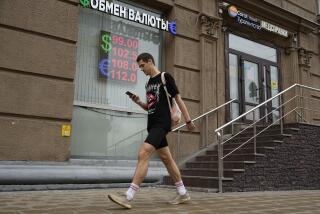S. Korea Ends Won Defense
- Share via
SEOUL — In what could be the most far-reaching devaluation of an Asian currency to date, the South Korean won tumbled past the psychological milestone of 1,000 to the dollar Monday after the government retreated from its defense of the currency.
The won’s deterioration could place greater pressure on Japan’s lackluster economy and troubled banks while leaving the United States as one of the few attractive markets for Japanese and South Korean products, adding to the gathering forces that point toward a surge of cheap U.S.-bound exports.
The fall of the won has been triggered both by South Korea’s own problems and a wave of currency devaluations that started in Thailand in early July. The currency contagion quickly swept through most of Southeast Asia, eventually leading to sharp declines in many of the world’s stock markets, including that of the United States.
South Korea has the world’s 11th-largest economy--with annual output larger than that of Thailand, Malaysia and Indonesia combined--so its troubles could have far greater impact on neighboring Japan and the entire global economy than what the world has already seen this fall from Southeast Asia.
A string of South Korean corporate bankruptcies this year has burdened the country’s banking system with a growing load of bad loans, and in recent months foreign investors have increasingly lost confidence in the country, leading to an outflow of capital and downward pressure on the won.
That, in turn, reverberates through Japan, whose own troubled banking system has some $24 billion in loans outstanding to South Korea. Chang Yi, an analyst at Kokusai Securities Co. in Tokyo, said the biggest threat to the Japanese economy from South Korea’s problems is the potential for additional burdens on Japan’s banks.
Trading in Seoul was halted Monday after the won weakened by its daily limit of 2.25%, to 1,008.60. That brought the devaluation to 16.3% this year, mainly in the last six weeks. Early today, the won continued to trade near its Monday high, at 1,012.80 to the dollar.
Monday’s midday retreat--after the bank sold an estimated $200 million to $300 million to bolster the won during morning trading--marked the third time this month that the central bank tried to draw a support line but then abandoned the effort. Dealers estimated the bank sold more than $1 billion last week to back the won.
Officials at the Bank of Korea, the country’s central bank, told reporters that they may resume intervention to defend the won’s value at a lower level.
The 1,000-won-to-the-dollar level had special psychological importance, with some currency dealers calling it the “Maginot Line”--a reference to the French line of defense breached by Germany early in World War II.
The stock market has also fallen sharply in recent months. The main Kospi stock index fell 22.39 points Monday, or 4.3%, to close at 496.98. The index is down 32% this year.
The retreat of foreign investors from South Korea “causes the currency to depreciate more than necessary and the stock market situation to be worse than necessary,” said Lee Hahn Koo, president of the Daewoo Economic Research Institute.
“This kind of lack of confidence makes a vicious circle not only in the foreign exchange and stock markets but also in the real economy,” Lee added.
While economic growth in South Korea is expected to slow next year from this year’s estimated 6%, the falling value of the won brings benefits as well as pain to this country’s economy. A weaker currency makes South Korean exports more competitive overseas and more profitable in won terms. Imports become more expensive, creating a better environment for sales by domestic firms.
The impact of Southeast Asia’s currency devaluations on Japan, the world’s second-largest economy, have been relatively muted because that region’s export products are relatively inexpensive and labor-intensive and often made in factories run by Japanese firms.
By contrast, South Korea competes head to head with Japan in many industrial areas. Therefore, a declining won against the yen confronts Japan with an increasingly competitive South Korea as both seek overseas markets.
There has been widespread speculation that South Korea will be the next Asian country needing a bailout by the International Monetary Fund, in the wake of similar rescue efforts taken to aid Thailand and Indonesia. Such a move is advocated by many private economists but resisted by Seoul because of the tough conditions attached to IMF bailouts.
Lee said a package of financial reforms awaiting passage by South Korea’s Parliament could help set the banking system on the road to recovery and would define a new role for the central bank. But the Parliament’s regular session for this year is due to end at midnight today, and passage of the full 13-bill package before then appears highly unlikely.
(BEGIN TEXT OF INFOBOX / INFOGRAPHIC)
Won Lost
South Korea’s corporate bankruptcies and other woes have taken their toll on the country’s currency, the won, which passed the 1,000-to-the-dollar mark on Monday. Won per dollar, weekly closes since Jan. 1 and latest:
(Please see newspaper for full chart information)
Monday: 1,008.60
Source: Bloomberg News
*
* Etsuko Kawase of The Times’ Tokyo bureau contributed to this report.
*
* U.S. STOCKS SHARPLY HIGHER: U.S. stocks rose as a resurgent Nikkei eased investors’ worries. D3
More to Read
Sign up for Essential California
The most important California stories and recommendations in your inbox every morning.
You may occasionally receive promotional content from the Los Angeles Times.









